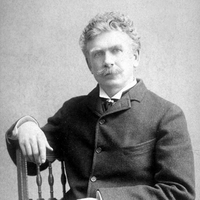A Vision of Doom
I stood upon a hill. The setting sun
Was crimson with a curse and a portent,
And scarce his angry ray lit up the land
That lay below, whose lurid gloom appeared
Freaked with a moving mist, which, reeking up
From dim tarns hateful with some horrid ban,
Took shapes forbidden and without a name.
Gigantic night-birds, rising from the reeds
With cries discordant, startled all the air,
And bodiless voices babbled in the gloom–
The ghosts of blasphemies long ages stilled,
And shrieks of women, and men’s curses. All
These visible shapes, and sounds no mortal ear
Had ever heard, some spiritual sense
Interpreted, though brokenly; for I
Was haunted by a consciousness of crime,
Some giant guilt, but whose I knew not. All
These things malign, by sight and sound revealed,
Were sin-begotten; that I knew-no more
And that but dimly, as in dreadful dreams
The sleepy senses babble to the brain
Imperfect witness. As I stood a voice,
But whence it came I knew not, cried aloud
Some words to me in a forgotten tongue,
Yet straight I knew me for a ghost forlorn,
Returned from the illimited inane.
Again, but in a language that I knew,
As in reply to something which in me
Had shaped itself a thought, but found no words,
It spake from the dread mystery about:
'Immortal shadow of a mortal soul
That perished with eternity, attend.
What thou beholdest is as void as thou:
The shadow of a poet’s dream-himself
As thou, his soul as thine, long dead,
But not like thine outlasted by its shade.
His dreams alone survive eternity
As pictures in the unsubstantial void.
Excepting thee and me (and we because
The poet wove us in his thought) remains
Of nature and the universe no part
Or vestige but the poet’s dreams. This dread,
Unspeakable land about thy feet, with all
Its desolation and its terrors-lo!
'T is but a phantom world. So long ago
That God and all the angels since have died
That poet lived-yourself long dead-his mind
Filled with the light of a prophetic fire,
And standing by the Western sea, above
The youngest, fairest city in the world,
Named in another tongue than his for one
Ensainted, saw its populous domain
Plague-smitten with a nameless shame. For there
Red-handed murder rioted; and there
The people gathered gold, nor cared to loose
The assassin’s fingers from the victim’s throat,
But said, each in his vile pursuit engrossed:
'Am I my brother’s keeper? Let the Law
Look to the matter.' But the Law did not.
And there, O pitiful! the babe was slain
Within its mother’s breast and the same grave
Held babe and mother; and the people smiled,
Still gathering gold, and said: ‘The Law, the Law,’
Then the great poet, touched upon the lips
With a live coal from Truth’s high altar, raised
His arms to heaven and sang a song of doom
Sang of the time to be, when God should lean
Indignant from the Throne and lift his hand,
And that foul city be no more!-a tale,
A dream, a desolation and a curse!
No vestige of its glory should survive
In fact or memory: its people dead,
Its site forgotten, and its very name
Disputed.'
‘Was the prophecy fulfilled?’
The sullen disc of the declining sun
Was crimson with a curse and a portent,
And scarce his angry ray lit up the land
That lay below, whose lurid gloom appeared
Freaked with a moving mist, which, reeking up
From dim tarns hateful with a horrid ban,
Took shapes forbidden and without a name.
Gigantic night-birds, rising from the reeds
With cries discordant, startled all the air,
And bodiless voices babbled in the gloom.
But not to me came any voice again;
And, covering my face with thin, dead hands,
I wept, and woke, and cried aloud to God!

